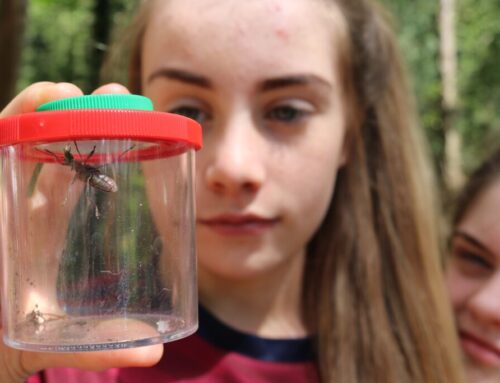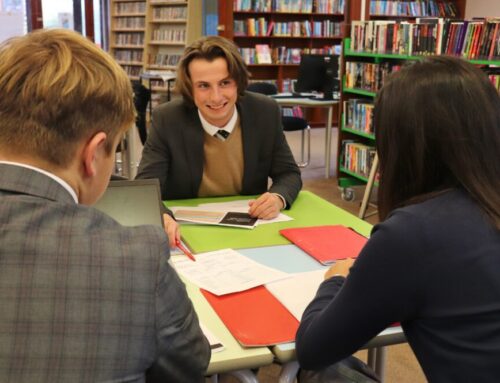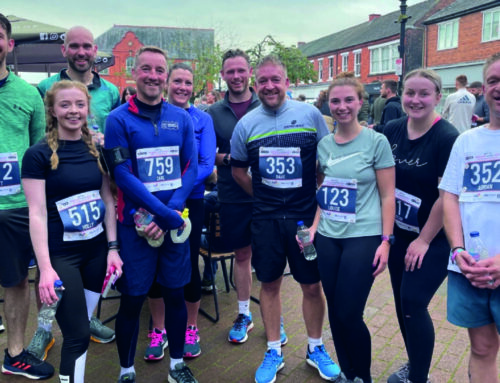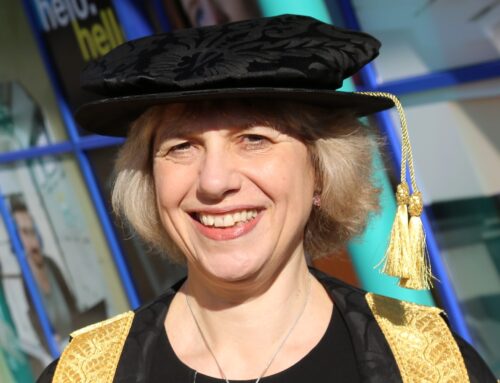Novel research examining how dogs and robotic dogs could boost children’s’ reading has been supported by Psychology students at Wrexham Glyndwr University. The project – which involved children at seven North Wales primary schools – has been evaluated by the students to examine the impact that reading to the dogs, both real and virtual, had on pupils.
This project was part-funded by GwE, the fully bilingual School Effectiveness and Improvement Service for North Wales. GwE works alongside and on behalf of the local authorities of Conwy, Denbighshire, Flintshire, Gwynedd, Wrexham and Anglesey to develop excellent schools across the region.
Two psychology students – Andrew Paine and Kirsty Le-Cheminant– were chosen by Glyndwr lecturer Dr Shubha Sreenivas to run a qualitative research assessment on the data produced by the project, speaking to teachers, transcribing interviews, and helping to produce a report on the research’s findings. The research was also backed with a British Psychological Society (BPS) Research Assistantship, and is part of a wider –ranging study which has seen cross-collaboration between Glyndwr’s Psychology and Computing degrees and lecturers.
Kirsty said: “The research involved seven primary schools in North Wales, where children were selected to participate.”
“Our main aim was to qualitatively investigate the children’s experiences of reading in each group, and to interview teachers to investigate how they felt about the activity as well. We therefore spent time interviewing children and teachers at the schools to discuss experiences of reading in each reading scenario. Andy and I then transcribed the interviews and began work on writing up the results of the research.” Andy added: “This research was into a really interesting topic, with potentially far-reaching implications in assisting children’s reading progression. We wanted to examine the benefits for a child when they read under the three conditions – to a teacher, to a live dog, and to a robotic dog – and to see which condition progressed the child’s reading age the most.”
While the research had been planned for some time, a number of changes had to be made after the Covid-19 pandemic forced a series of changes upon both the researchers – and the schools they were working with.
Kirsty said: “Due to COVID-19 we did have to cancel some of our face-to-face interviews due to not being able to go into schools. However, we did manage to conduct interviews with three schools overall.
“The quantitative data we collected after the children had spent time in their reading scenarios was also limited due to schools having to close and them having to prioritise making schools safe for pupils to return.”
And Andy added: “It was not an ideal situation for us – and meant we only had limited data to analyse – but we still had enough for meaningful interpretation.”
Both students have thanked their lecturers at Glyndwr for giving them the opportunity to take part in the research.
Andy said: “It was a great way to gain experience and an understanding of research processes.”
And Kirsty added: “I really enjoy studying Psychology at Glyndwr. The team are very supportive and are always looking for ways to improve the course and give students the best opportunities.
“As a mature student with family and work commitments, this project gave me the opportunity to work in my own time and was a very welcome distraction over ‘lockdown’.
“The project has also given me insight into what working as a research assistant would be like, and I am certainly considering looking for research assistant positions in the future.”
Kirsty’s work was also supported by the BPS with a Research Assistantship. She added: “Overall, I am really pleased that I was selected for the BPS Research Assistantship.
“I have found it to be an enjoyable and valuable experience. It has been a fantastic opportunity to develop my skills in areas I would not have otherwise had the opportunity to try.
“The project has also kept me engaged in academic studies over the summer, and I now feel more confident going into the final year of my degree.”
The Research Assistantship is the latest boost for Glyndwr’s Psychology team from the BPS – whose work on student enrichment was commended by the society earlier this year.
In January, the British Psychological Society visited Wrexham Glyndŵr University as part of their ongoing accreditation process for the BSc (Hons) Psychology and MSc Psychology (Conversion) programmes.
Their report stated: “The programme team is commended for its hosting of the enrichment week dedicated towards psychology students.
“Students complimented the tailor made advice offered to students throughout their journey at the university, which began from the open day and remained throughout the programme.
“The attendance of guest speakers and involvement of charities promotes the ‘Engagement that Enables’ strategy at the university. The students commented on the confidence and growth that they acquired from taking part in the activities and opportunities available throughout the week.”
Dr Shubha Sreenivas, Programme Leader for Glyndwr’s MSc Psychology (Conversion) course, said: “I would like to thank Andy and Kirsty for all their work assisting our research project over the summer – while they may not have been operating under the conditions we would have wished for, their dedication to their work and speedy transformation of their approach helped produce a thorough report on the research we have been doing.
“I’d also like to thank the British Psychological Society for helping our work by funding a Research Assistantship.
“Alongside the rare commendation they gave us for providing an excellent student experience during our Enrichment Week, it is a testament to the work we’re doing here at Glyndwr and we are very grateful.”
To find out more about Wrexham Glyndwr University’s BSc Psychology course click here: https://www.glyndwr.ac.uk/en/Undergraduatecourses/Psychology/ and to find out more about the MSc (Conversion) course click here: https://www.glyndwr.ac.uk/en/Postgraduatecourses/PsychologyConversion/







